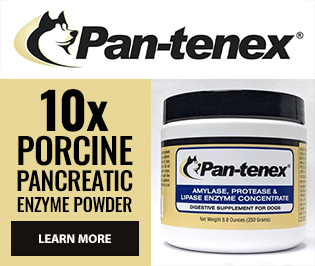It can be unsettling to see your dog eat stool, whether their own or from another animal. Known as coprophagia, this behavior is more common than most owners realize, and it often points to a digestive issue or nutrient imbalance. Fortunately, with the right tools and dietary support, including digestive enzymes, this habit can often be reduced or eliminated.
What Causes Dogs to Eat Stool?
There are several reasons why a dog might turn to stool-eating, and not all of them are behavioral. Many stem from issues with digestion or nutrient absorption:
- Incomplete Digestion: If your dog isn’t fully breaking down food, the stool may still contain nutrients or undigested material that smells appetizing to them.
- Enzyme Deficiency: Some dogs lack the natural enzymes needed to break down fats, proteins, or carbohydrates efficiently.
- Malabsorption Issues: When nutrients are not properly absorbed, your dog’s body may crave what it’s missing, which can lead to scavenging behavior.
- Poor Diet or Low-Quality Food: Dogs eating nutritionally poor food may seek out other sources to meet their body’s needs.
In some cases, especially with puppies, it can be a learned behavior or a form of exploration. But in adult dogs, it often signals something worth looking into.
The Role of Digestive Enzymes
Digestive enzymes help break food down into absorbable nutrients. When a dog lacks these enzymes, food may pass through partially digested, leaving behind stool that smells more like food than waste.
By introducing a high-potency enzyme like Pan-tenex, you support complete digestion at the source. This reduces the chances of partially digested food reaching the stool and removes one of the triggers for this behavior.
Additional Tips to Curb Stool Eating
Along with adding digestive enzymes, try these steps to discourage stool-eating behavior:
- Pick Up Waste Quickly: Remove temptation by cleaning up your yard immediately after your dog eliminates.
- Improve Diet Quality: A nutritionally complete diet can help prevent your dog from seeking missing nutrients elsewhere.
- Add Taste Deterrents: Some supplements make stool taste unpleasant to dogs, reducing the urge to eat it.
- Provide Mental Stimulation: Bored dogs are more likely to develop unwanted habits. Keep your dog active and engaged.
Monitoring Progress
If you’re starting your dog on enzymes, we recommend using the Dog Enzyme Digestive Health Stool Tracker to watch for signs of improvement. Many dogs show better stool quality, reduced gas, and fewer digestive symptoms in just a few days. Always consult with your veterinarian to discuss any unusual symptoms or concerns.
Breaking a habit like stool eating takes consistency. Most dog owners find that with the right digestive support, the issue fades quickly. If questions come up along the way, browse our other help articles or contact us.

